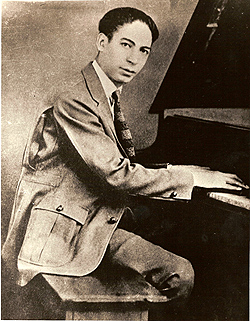| |
 |
|
Jelly
Roll Morton
Creole of Color
born October 20, 1890
in or near New Orleans. |
|
|
Jelly Roll Morton .......Part 1 |
| |
|
Jelly Roll Morton .......Part 2 |
| |
Jelly
Roll Morton
Related Website:.
.DrJazz.com Click here
|
|
| |
He was
a Creole,
born Ferdinand Joseph Lamothe. As a youngster he learned to
play the piano and absorbed, and remembered, an enormous part
of the multi-faceted musical culture of New Orleans, including
its advanced jazz rhythmic style.
He left home at the age
of about seventeen and spent many years traveling, playing
piano, hustling pool, and working in vaudeville, all the while
refining a distinctive and original jazz piano style that
increasingly left ragtime conventions behind.
He
had his greatest success as a publishing composer and
as a recording musician-pianist and bandleader in Chicago
from 1923 to 1928. But as many were doing, he left for New
York in 1928, never achieving there the consistent success,
artistic or financial, that he had enjoyed earlier.
In the
1930s, after losing opportunities to publish and record, he
moved in 1953 to Washington, D.C. There Alan Lomax, working
at the Archive of Folk Song of the Library of Congress heard
Morton and persuaded him to record a series of interviews
and performances.
This
resulted in about eight hours of recordings, made on
a not always-reliable disc recorder in 1938, in Coolidge Auditorium
of the Library of Congress. In the recordings, Morton played
and sang and spoke of his life and of the early days of jazz and of the culture it sprang from. The set is a remarkable series
of recordings, interesting as music, biography, folklore, and
history. However Alan Lomax
conceived of them, perhaps as archival
material, he and Morton probably did not foresee that they would
be issued commercially.
We know Morton mainly from his
recordings in the 1920s, ones in which he is either a solo jazz
pianist or bandleader. But he served a long apprenticeship,
between 1907 and 1917, as a pianist-entertainer and onstage
vaudeville performer.
In "Anamule Dance" we hear some
of the material he used in those earlier days. Perhaps the circa-1915
humor doesn't hold up. But Morton the jazzman is always present
in this swinging performance and comes to the fore especially
in the last chorus, as Morton sings and simultaneously plays
an exciting accompaniment. It's hard to believe that even Tony
Jackson could have done better.
|
Taken
from:
Anamule Dances'
"Jelly Roll Morton" |
|
|

